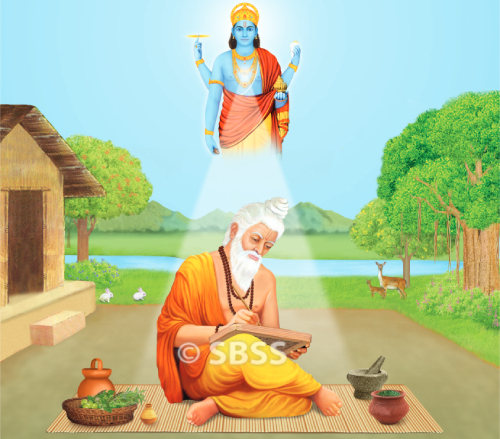Ayurveda for a healthy life ! – 33/2024 uploaded on 1. 8.2024

Grahabadha
There is a subtle-world much more vast than the physical world we actually see. Incidents taking place in this world affect the health of human beings too. Ayurveda calls these subtle aspects ‘grahas’.
Under Grahabadha three types of disorders may be included.
1. Affections by supernatural powers like ghosts and witches. In these affections, manifestations of involvement of central nervous system (C.N.S.) like tremors, unconsciousness and twitching are associated with psychological symptoms like fear and laughing without reason. In addition, systemic manifestations such as diarrhoea, cough and fever are also present.
Some of the entities described under Grahabadha can be fitted under the diagnosis of hepatic coma characterised by foetor hepaticus, uraemia characterised by urine-like smell and other encephalopathies. However, one occasionally comes across cases, which do not fit with any of the known disease entities & where the aetiological factors remain idiopathic or unknown. Even today, it is not possible to disprove the existence of Supernatural powers like ghosts, witches, etc. Hence, it is important to keep in mind the possibility of affection of babies with supernatural powers and prescribe the treatment on the lines given in this chapter.
2. Infectious diseases involving central nervous system (which
in modern medicine are termed as meningitis, encephalitis etc.) are included in Ayurveda under graha badha as well as under sannipatika jwara.
3. Psychiatric diseases, particularly involving disorders of personality such as –
A. Devagraha – God-like personality
B. Daityagraha – Demon-like personality
C. Gandharvagraha – Engrossed in music and sex
D. Sarpagraha – Serpent-like personality
E. Yakshagraha – Semi-God-like personality
F. Brahmarakshas – Demon-like personality
G. Rakshas – Demon-like personality
H. Pretagraha – Unclean person
I. Kooshmandagraha
J. Nishadagraha – Aboriginee
K. Onkirana – Arrogant
L. Vetalagraha – Sleepy personality
M. Pitrugraha – Forefathers
N. Pishachagraha – Ghost-like personality
1. Manifestations of affection by supernatural powers
The premonitory symptoms are excessive crying and fever.
A. General symptoms : Fever, irritability, crying continuously, yawning, barking, screaming, shouting, biting lips, clenching teeth, clenching fists, scratching mother’s as well as one’s own body with nails, refusal to take feeds, miserable look, emaciation, shrill cry, excessive perspiration, excessive salivation, swelling of the eyes, conjunctivitis, excessive watering of the eyes; rubbing the eyes, ears and nose; squint, vitiation of breast milk, anaemia, jaundice and palpitation are the symptoms of graharogas.
B. Central Nervous System
1. Psychological : Fear, pulling of hair, biting the tongue and mother’s breast, laughing alone without reason.
2. Organic : Vacant look, unconsciousness, hypotonia, drowsiness, giddiness, diminished vision, irritability, insomnia, rolling of eye-balls, change in voice and speech, facial palsy
with drooling of saliva, weak voice, jerky movements of head, paralysis, stiffness, twitching of eyelids and facial muscles, tremors, spasms of the body, convulsions, emprosthotonus, headache, opisthotonus, pleurosthotonus, fainting, ptosis, retention of urine, incontinence of urine and stool.
3. Sense and motor organs : Blindness, diseases of nose, ears and eyes.
4. Gastro-intestinal : Constipation, distension, stomatitis, thirst, diarrhoea, vomiting, glossitis, borborygmi, visoochika. (Cholera like disease characterised by pricking pain in the abdomen)
5. Respiratory System : Foam at the mouth, cough, hiccup, grunting respiration
6. Skin : Change in colour, goose-skin, urticaria, blisters, pyoderma, perianal excoriation, prominent veins over skin of abdomen.
7. Smell of the body : Smell of the body resembles that of fat, pus, faecal matter, bird, crow, goat or corpse.
| Smell of the Body | Affected by Graha | Characteristic Symptoms |
| Fat or blood | Shanda | – |
| Pus or blood | Sanda Apasmara | – |
| Goat or fat | Nailamesha | – |
| Faeces | Shwagraha | Barking (Hydrophobia) |
| Corpse | Pitru | – |
| Bird | Shakuni | – |
| Crow | Pootana | – |
| Fat or sour and foul | Sheetapootana | Half of the body is cold and the other half warm |
| Fish | Andhapootana | Diminished Vision |
| Cow’s urine or human | Mukhamandika | Prominent abdominal veins |
| Urine | ||
| Goat | Revati | Cyanosis |
| Vulture | Shushka revati | Progressive emaciation |
| Foul-smelling | Lohita | – |
| Vulture like and foul-smelling | Aryaka | – |
Lohita, Revati and Vayasi give rise to crowing sound in the baby; Kumari, Shakuni, Shiva, Urdhwakeshi and Sena grahas affect the newborn baby from 1st to 8th day respectively. According to Ravana, Nandana, Sunanda, Pootana, Mukha-mandika, Kathapootana, Shakunika, Sootika, Nirrhuta and Pilipicchika grahas affect the babies and children on the first to eleventh day, month or year respectively.
When Revati graha affects a girl or a woman, it leads to reproductive failure which manifests in the form of :
A. Absence of secondary sex characters
B. Absence of menstruation
C. Abnormalities of menstruation
D. Abortions
E. Miscarriage
F. Foetal death
G. Stillborn babies
H. Children dying immediately after birth
I. Children dying within first few hours
J. Children dying within first few months
K. Children dying within first few years.
| Ayurveda mediates certain lifestyle and natural therapies in order to recover a balance between the body, mind, spirit, and the environment. |
Cont’d—–

 Take Disciplinary Action Against Charitable Hospitals Violating Rules : Surajya Abhiyan
Take Disciplinary Action Against Charitable Hospitals Violating Rules : Surajya Abhiyan Detergent found in ice-creams, phosphoric acid in soft drinks !
Detergent found in ice-creams, phosphoric acid in soft drinks ! Vitamins
Vitamins Spiritual research on popular biscuits in the market by Maharshi Adhyatma Vishwavidyalay
Spiritual research on popular biscuits in the market by Maharshi Adhyatma Vishwavidyalay Ability to cook is necessary for healthy relationships
Ability to cook is necessary for healthy relationships